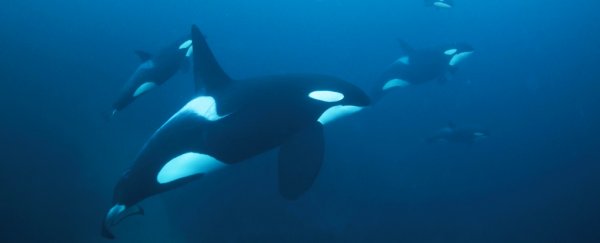In all the animal kingdom - all those tens of thousands of mammals, birds, fish and amphibians - only a handful are known to continue living on long after menopause. Humans are included in this handful. The others are all cetaceans: beluga whales, narwhals, short-finned pilot whales, and, famously, the magnificent monarchs of the sea, orcas.
Now, new research has found yet another benefit conferred by having post-reproductive orca (Orcinus orca) nannas around: it increases the survival chances of the younger generations.
Scientists studying decades of census data on orca populations around Washington State in the US and British Columbia in Canada found that orca calf mortality rate rose in the years immediately following the death of a post-menopausal grandmother, compared with calves with living grandmothers and calves with grandmothers still breeding.
"The study suggests that breeding grandmothers are not able to provide the same level of support as grandmothers who no longer breed. This means that the evolution of menopause has increased a grandmother's capacity to help her grand-offspring," said biologist Dan Franks of the University of York in the UK.
"The death of a post-menopausal grandmother can have important repercussions for her family group, and this could prove to be an important consideration when assessing the future of these populations. As salmon populations continue to decline, grandmothers are likely to become even more important in these [orca] populations."
Female orcas reach sexual maturity at about 10 years of age, and stop reproducing between 30 and 40 years of age. In the wild, they can live much longer than that, though: 80 to over 100 years, which is usually decades longer than males.
And previous research has shown that being post-reproductive doesn't make these grandmas unproductive in other ways.
For one thing, a longer reproductive period would mean more calves for each pod, stretching and straining resources as multiple generations continue to produce offspring at once. A limited reproductive period means there's less competition for food resources for the calves.
In fact, grandmother orcas seem to be the leaders of each pod. They know the best hunting grounds and techniques; their leadership especially comes to the fore during times of privation.
These benefits are explained by the grandmother hypothesis, which proposes that menopause creates a generation of wiser family members that contributes to the overall wellbeing of their kin and clan, now that they are not preoccupied with birthing and raising their own young.
But other animals, such as elephants, also have grandmothers that take care of their grand-calves; and they do so while still having their own babies. So scientists think menopause must be more complex.
The researchers studied census data for two pods of orcas. For the southern population, the years spanned from 1976 to 2016, and from 1973 to 2016 for the northern population. This data included each orca's date of birth, date of death and who their mother was, if that information was available.
From this, they were able to figure out the age at death for each individual orca, who their maternal grandmother was, and when their grandmother died. This data was filtered only to include orcas with a known maternal grandmother, resulting in a sample of 378 orcas - 92 males, 76 females, and 210 orcas who died before reaching sexual maturity.
The team found that, in the two years following a maternal grandmother's death, a young orca was 4.5 times more likely to die than orcas with post-menopausal grandmothers still living, and 1.5 times more likely to die than orcas with still-reproducing grandmothers.
This, the researchers said, is evidence for the grandmother effect in orcas.
"We suspect when breeding grandmothers are supporting their own calves, their movement and activity patterns are constrained and they are not able to provide support and leadership in the same way as post-menopausal females," explained behavioural ecologist Stuart Nattrass of the University of York.
"Also, grandmothers with their own calves will be busy caring for their own calves, and be able to invest less in their grand-offspring, compared to post-menopausal grandmothers."
This, the researchers said, can help explain why, just as it has in humans, menopause evolved in orcas. Although the exact dynamics are unclear, it seems that post-menopausal orca nannas greatly benefit the survival of their grand-calves.
For their future research, the researchers are now using drones to understand the family dynamics of inter-generational orca pods in finer detail.
The research has been published in PNAS.
